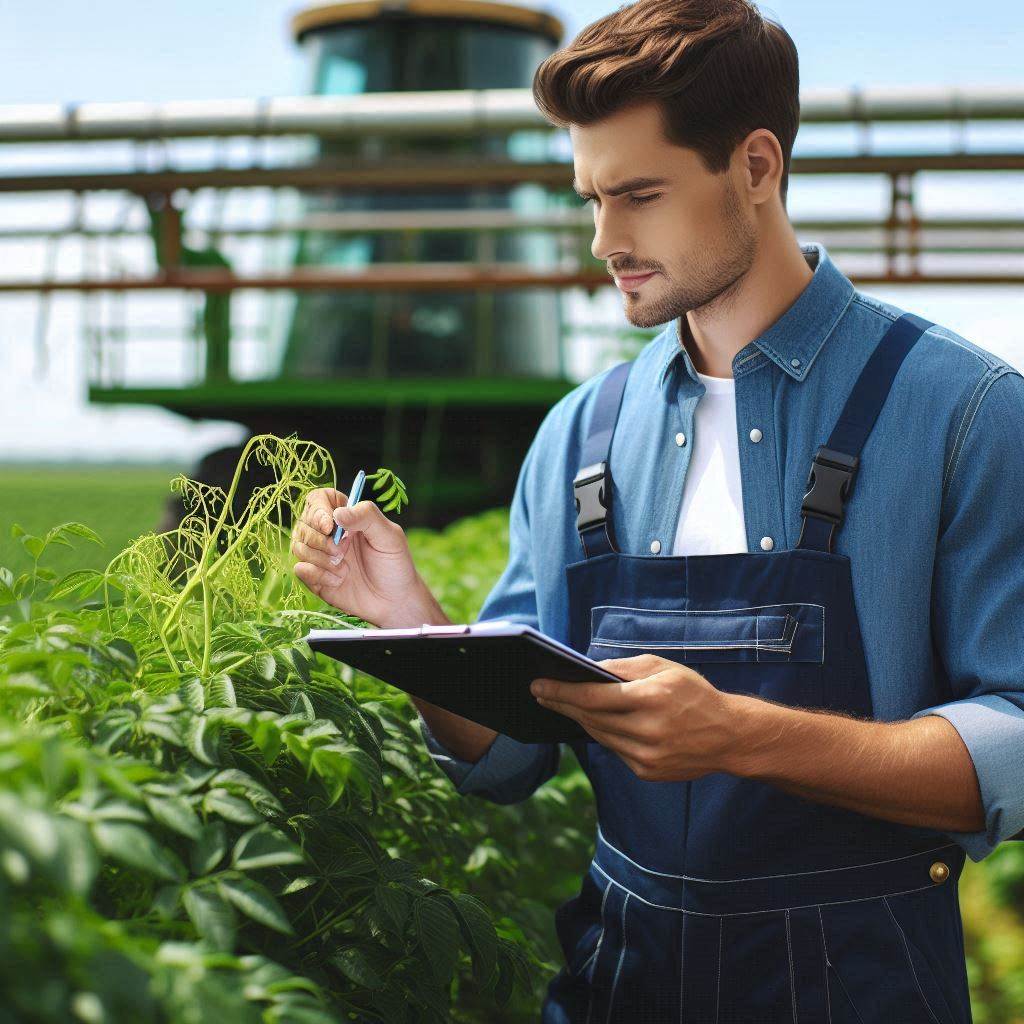Introduction
Agricultural engineering and animal husbandry are critical fields that ensure the sustainability and productivity of agriculture.
Agricultural engineers play a vital role in designing and improving systems that support efficient farming practices and livestock management.
In animal husbandry, their expertise enhances breeding, nutrition, and overall animal welfare, contributing significantly to food security and agricultural sustainability.
These engineers specialize in various areas, such as irrigation systems, soil management, and environmental control, all of which are crucial for optimizing agricultural output.
Their work in animal husbandry includes developing advanced feeding systems, health monitoring technologies.
Efficient waste management solutions, which are essential for maintaining healthy livestock and minimizing environmental impact.
Agricultural engineers are indispensable in advancing modern farming techniques and animal husbandry practices.
Their contributions are fundamental in addressing the challenges of feeding a growing global population and ensuring the sustainability of agricultural systems.
As the demand for efficient and sustainable agriculture grows, so does the importance of this profession.
Role of Agricultural Engineers
Designing and Implementing Agricultural Machinery for Animal Husbandry
Agricultural engineers play a crucial role in designing and implementing machinery for animal husbandry.
They develop equipment that enhances the efficiency and safety of livestock farming operations.
This includes machines for feeding, milking, and waste management, which streamline processes and reduce labor.
Engineers design feeders that distribute food evenly and prevent wastage.
These systems ensure that all animals receive the necessary nutrients for optimal growth.
They also develop automated feeding systems that reduce the time and effort required for manual feeding.
Milking machines are another significant innovation.
Engineers create devices that improve the milking process, increasing efficiency and hygiene.
These machines help maintain milk quality and reduce the risk of contamination, benefiting both farmers and consumers.
Waste management systems are essential for maintaining a clean and healthy environment in livestock facilities.
Agricultural engineers design manure handling equipment that efficiently removes and processes waste.
This not only keeps the facilities clean but also helps in recycling waste as fertilizer.
Developing Efficient Systems for Livestock Housing and Feeding
Efficient livestock housing and feeding systems are crucial for animal welfare and productivity.
Agricultural engineers develop housing solutions that provide comfort, safety, and optimal living conditions for animals.
Proper housing protects livestock from extreme weather and reduces the risk of disease.
They design ventilation systems that ensure adequate airflow, maintaining a healthy environment within the housing.
These systems control temperature and humidity levels, preventing respiratory issues and other health problems in livestock.
Feeding systems are carefully designed to meet the nutritional needs of different animal species.
Agricultural engineers work on developing automated feeding systems that accurately dispense the right amount of feed.
This precision helps in maintaining consistent growth and health among livestock.
Watering systems are another critical aspect of livestock management.
Engineers design systems that provide clean and adequate water supply, essential for animal health.
Automated watering systems ensure that livestock have constant access to fresh water, reducing the risk of dehydration and disease.
Agricultural engineers significantly contribute to animal husbandry by designing and implementing advanced machinery and efficient systems for livestock housing and feeding.
Their innovations in machinery enhance productivity and ensure the well-being of livestock.
By developing automated feeding and watering systems, they optimize resource use and reduce labor, benefiting both farmers and animals.
These advancements are crucial for sustainable and efficient livestock farming, ensuring high standards of animal welfare and farm productivity.
Skills Required
Agricultural engineers and animal husbandry professionals play a crucial role in ensuring the efficiency and sustainability of agricultural operations.
They need to possess a diverse set of skills and knowledge to effectively perform their duties in this field.
Technical Knowledge in Mechanics and Engineering Principles
Agricultural engineers must have a solid foundation in mechanics and engineering principles to design, develop.
Implement various types of agricultural equipment and machinery.
They need to understand how different machines work and how they can optimize their performance to enhance productivity.
Having technical knowledge in mechanics allows agricultural engineers to troubleshoot and repair equipment when issues arise.
They must be able to diagnose problems quickly and efficiently to minimize downtime and prevent disruptions to the farming operations.
Understanding of Animal Behavior and Welfare
Animal husbandry professionals need to have a deep understanding of animal behavior and welfare to ensure the well-being of livestock on farms.
They must be able to recognize signs of distress or illness in animals and take appropriate measures to address these issues promptly.
By understanding animal behavior, animal husbandry professionals can create ideal living conditions for livestock, including providing proper nutrition, housing, and healthcare.
This knowledge also helps in implementing effective breeding programs to improve the quality and productivity of livestock.
Problem-Solving Skills in Agricultural Settings
Agricultural engineers and animal husbandry professionals must possess strong problem-solving skills to address challenges that may arise in agricultural settings.
They need to be able to think critically and come up with innovative solutions to improve efficiency and productivity on farms.
Whether it’s a technical issue with machinery or an animal health concern.
These professionals must be prepared to identify the root cause of the problem and implement effective solutions.
Problem-solving skills are essential for overcoming obstacles and ensuring the success of agricultural operations.
Most Importantly, agricultural engineers and animal husbandry professionals play key roles in the agricultural industry.
Their skills are essential for the sustainability and success of farming operations.
By possessing technical knowledge, understanding animal behavior, and having strong problem-solving skills.
These professionals can contribute significantly to the advancement of agriculture and animal husbandry practices.
Read: Exploring Architect Salary Trends: USA Analysis.
Education and Training
Academic Requirements for Becoming an Agricultural Engineer
To become an agricultural engineer, individuals must meet certain academic requirements.
Typically, a bachelor’s degree in agricultural engineering or a related field is required.
Courses in subjects such as biology, chemistry, physics, and mathematics are important for developing a strong foundation in engineering principles.
Furthermore, prospective agricultural engineers may also choose to pursue advanced degrees, such as a master’s or PhD in agricultural engineering, to further specialize in a specific area of the field.
Some universities offer specialized programs in agricultural engineering that focus on areas such as crop production, soil mechanics, and water resource management.
In addition to formal education, hands-on training through internships or cooperative programs with agricultural companies can provide valuable practical experience.
These opportunities allow aspiring agricultural engineers to apply their knowledge in real-world settings and gain a better understanding of the challenges and opportunities in the field.
Specializations Available in Animal Husbandry within the Field
Within the field of agricultural engineering, there are various specializations available in animal husbandry.
Some of the common specializations include:
- Livestock Production: Agricultural engineers specializing in livestock production focus on the care and management of animals raised for food, fiber, or other products.
They may work on improving housing systems, feeding practices, and breeding programs to ensure the health and welfare of animals. - Poultry Science: Engineers specializing in poultry science focus on the production and management of poultry, such as chickens, turkeys, and ducks.
They are responsible for designing facilities, optimizing production processes, and implementing biosecurity measures to prevent disease outbreaks. - Animal Behavior and Welfare: Agricultural engineers specializing in animal behavior and welfare study the psychological and physiological needs of animals to ensure their well-being in agricultural settings.
They may work on improving housing conditions, handling practices, and environmental enrichment to promote animal health and productivity. - Veterinary Technology: Engineers specializing in veterinary technology develop technologies and tools to diagnose, treat, and prevent diseases in animals.
They may work on designing medical devices, developing vaccines, and implementing biosecurity measures to protect animal populations from health risks.
Overall, agricultural engineers play a crucial role in advancing animal husbandry practices through their expertise in engineering principles, technology, and innovation.
By specializing in specific areas of animal husbandry.
These professionals can contribute to the sustainable and ethical management of livestock and poultry operations for the benefit of both animals and society.
Read: From Intern to Lead: Climbing the Software Ladder in the US
Career Opportunities
As an agricultural engineer focusing on animal husbandry, there are various job prospects in the sector.
These opportunities allow individuals to work with livestock, develop sustainable practices, and improve animal welfare.
Job Prospects for Agricultural Engineers in the Animal Husbandry Sector
Agricultural engineers specializing in animal husbandry have promising job prospects due to the growing demand for efficient and sustainable livestock production.
These professionals are sought after for their expertise in designing systems that enhance animal welfare, optimize production, and ensure environmental sustainability.
One of the primary roles of agricultural engineers in this sector is to develop and implement technologies that improve the efficiency of animal husbandry operations.
This includes designing advanced feeding systems, waste management solutions, and climate control systems for livestock facilities.
Their work helps reduce costs and increase productivity, making them valuable assets to the industry.
Engineers with skills in data analysis and automation are particularly in demand as the industry moves towards precision agriculture.
They work on integrating sensors and data analytics into farm operations, providing real-time insights into animal health and production metrics.
This technological shift is creating new opportunities for engineers with expertise in these areas.
Additionally, there is a growing focus on sustainability and animal welfare in the industry.
Agricultural engineers contribute by designing systems that reduce environmental impact and improve living conditions for animals.
This includes innovations in water conservation, energy efficiency, and waste management.
As regulations around animal welfare and environmental protection tighten, the demand for skilled engineers in these areas is expected to rise.
Transform Your Career Today
Unlock a personalized career strategy that drives real results. Get tailored advice and a roadmap designed just for you.
Start NowPotential Work Settings Such as Farms, Research Institutions, and Government Agencies
Agricultural engineers specializing in animal husbandry can find employment in a variety of settings.
One common workplace is on farms and livestock production facilities.
Here, they design and manage systems for feeding, housing, and caring for animals.
They may also oversee the implementation of new technologies and practices to enhance efficiency and sustainability.
Research institutions and universities are another significant employer of agricultural engineers.
In these settings, engineers conduct research on new technologies and methods for improving animal husbandry.
They may work on developing new feed formulations, breeding programs, or health monitoring systems.
These roles often involve collaboration with scientists and other experts in the field.
Government agencies also employ agricultural engineers, particularly in roles related to regulation and policy development.
Engineers in these positions may work on setting standards for animal welfare, environmental protection, and food safety.
They also help in developing guidelines for the construction and operation of livestock facilities.
These roles are crucial in ensuring that industry practices meet regulatory requirements and public expectations.
Consultancy firms offer another avenue for employment, where engineers provide expert advice to farmers, agribusinesses, and other stakeholders.
They help clients optimize their operations, implement new technologies, and comply with regulations.
This role often involves a combination of fieldwork and office-based activities, providing a diverse and dynamic work environment.
Agricultural engineers specializing in animal husbandry have a range of job prospects in farms, research institutions, and government agencies.
Their expertise is crucial for improving livestock production efficiency, ensuring animal welfare, and promoting sustainability.
As the industry continues to evolve, the demand for skilled engineers in these areas is expected to grow, offering diverse and rewarding career opportunities.
Read: US Tech Hubs Beyond Silicon Valley: Emerging Cities
Learn More: How to Transition to Aerospace Engineering from Another Field
Challenges in the Field
Agricultural engineers and animal husbandry professionals face numerous challenges in their field.
Balancing technology with traditional farming practices to addressing environmental concerns in animal husbandry.
Balancing Technology and Traditional Farming Practices
One of the main challenges for agricultural engineers and animal husbandry professionals is finding a balance between adopting new technologies and preserving traditional farming practices.
On one hand, advancements in technology have led to increased efficiency, productivity, and profitability in agriculture.
Precision agriculture, for example, allows farmers to use data-driven insights to optimize crop yields and minimize waste.
However, the rapid pace of technological advancement can also pose challenges.
Farmers may struggle to keep up with the latest innovations or face barriers to adopting new technologies due to cost or lack of access to resources.
Moreover, the push towards automation and mechanization in agriculture raises concerns about the impact on rural communities and traditional farming practices.
Agricultural engineers must navigate these complexities to ensure that technological advancements are implemented in a sustainable and equitable manner.
Addressing Environmental Concerns in Animal Husbandry
Animal husbandry professionals also face challenges related to environmental sustainability and animal welfare.
The intensive production methods commonly used in modern agriculture can have detrimental effects on the environment, soil degradation, and greenhouse gas emissions.
Efforts to address these concerns include the development of sustainable farming practices, such as rotational grazing, integrated pest management, and organic farming.
Animal husbandry professionals play a crucial role in implementing these practices to minimize environmental impact and promote sustainable land use.
Additionally, animal welfare is a growing concern in the agricultural industry.
There is a growing recognition of the need to improve living conditions for livestock and ensure humane treatment throughout the production process.
Animal husbandry professionals must prioritize animal welfare in their work and advocate for ethical practices in the industry.
Therefore, agricultural engineers and animal husbandry professionals face a wide range of challenges in their field.
Balancing technology with traditional farming practices to addressing environmental concerns in animal husbandry.
By staying informed, collaborating with stakeholders, and advocating for sustainable practices.
These professionals can work towards a more sustainable and ethical agricultural industry.
Read: Decoding the Ethics & Responsibilities of US Civil Engineers

Explore Further: Advanced Degrees in Geotechnical Engineering
Advancements in Technology
Impact of Automation and Precision Agriculture on Animal Farming
One of the most significant advancements in animal husbandry is the integration of automation and precision agriculture.
This technology has revolutionized the way farms manage their livestock, resulting in increased efficiency and productivity.
Automation in animal farming includes the use of robotic systems for feeding, milking, and monitoring livestock.
These systems can operate 24/7, ensuring that animals are well taken care of at all times.
This not only reduces the workload on farmers but also ensures that animals receive the care and attention they need.
Precision agriculture, on the other hand, involves the use of data-driven techniques to optimize farming practices.
By collecting and analyzing data on things like animal health, feed consumption, and environmental conditions.
Farmers can make more informed decisions that lead to better outcomes for their livestock.
For example, sensors can be used to monitor the health and behavior of individual animals in real-time.
This allows farmers to identify issues quickly and take corrective action before they escalate.
Additionally, precision feeding systems can adjust feed rations based on each animal’s specific needs, resulting in healthier and more productive livestock.
Role of Data Analytics in Optimizing Livestock Management
Data analytics plays a crucial role in optimizing livestock management by providing farmers with valuable insights that can improve decision-making and overall farm performance.
By collecting and analyzing data on various aspects of animal husbandry, farmers can identify trends, patterns, and opportunities for improvement.
One key area where data analytics is making a difference is in disease prevention and control.
By analyzing historical data on disease outbreaks and patterns, farmers can implement proactive measures to minimize the risk of infection and spread among their livestock.
This not only improves animal welfare but also helps protect the farm’s bottom line.
Transform Your Career Today
Unlock a personalized career strategy that drives real results. Get tailored advice and a roadmap designed just for you.
Start NowAdditionally, data analytics can be used to optimize feed formulations and feeding schedules based on factors like animal weight, age, and breed.
This ensures that each animal receives the nutrients they need to thrive, leading to healthier and more productive livestock.
Overall, advancements in technology, such as automation, precision agriculture, and data analytics, are transforming the way farmers manage their livestock.
By leveraging these tools and techniques, farmers can improve efficiency, productivity, and animal welfare on their farms.
Uncover the Details: Biomedical Engineering: What You Need to Know
Delve into the Subject: Geotechnical Engineering: Lab Testing Procedures
Conclusion
Agricultural engineers play a crucial role in improving animal welfare and increasing productivity through innovative technologies.
They design and implement systems for efficient feeding, housing, and waste management, ensuring optimal conditions for livestock.
By utilizing their engineering skills, they enhance animal health, nutrition, and reproduction, contributing to overall farm sustainability.
Agricultural engineers also focus on environmental conservation, developing strategies to reduce the ecological footprint of animal agriculture.
Their expertise in mechanical, electrical, and biological systems allows them to create solutions that benefit both farmers and animals.
In addition, they stay updated on industry advancements and regulations to provide cutting-edge solutions for animal husbandry practices.
If you have a passion for both engineering and agriculture, a career as an agricultural engineer in animal husbandry could be a perfect fit.
With the demand for sustainable farming practices on the rise, the need for skilled professionals in this field is increasing.
By pursuing a career in agricultural engineering, you can make a meaningful impact on the food industry and animal welfare.
Consider exploring internships or educational programs that focus on animal husbandry to gain valuable experience and knowledge.
Joining professional organizations and networking with industry experts can also help you build a strong foundation for your future career.
Overall, becoming an agricultural engineer in animal husbandry offers a rewarding opportunity to blend engineering principles with the care of livestock.




